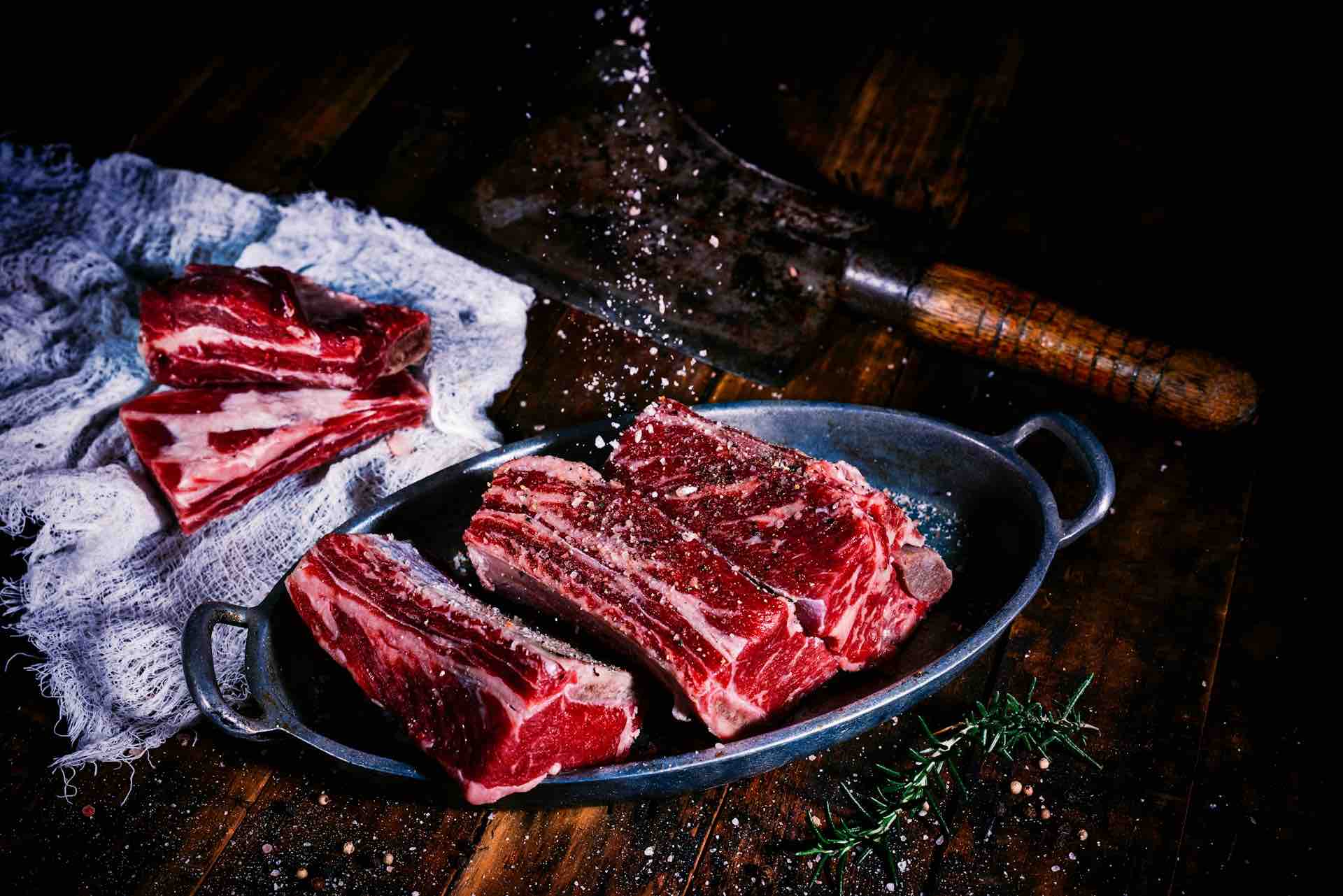Dr Shawn Baker: Carnivore diet meal plans aren’t dangerous!
Unfiltered sat down with Dr Shawn Baker, MD, author of The Carnivore Diet, to get his response to some of the most common criticisms of carnivore diet meal plans and why he continues to fight for the cause despite widespread condemnation from government bodies and leading nutritional scientists.
This transcript has been taken from our video interview with Dr Shawn Baker, MD. It has been edited for clarity and brevity. You can watch the full video interview here.
One of the biggest criticisms of the carnivore diet is the lack of diverse nutrients, specially dietary fibre, which research suggests can lower the risk of colorectal cancers, and counter-act some of the alleged negative impacts of eating too much red meat. How do you respond to these specific criticisms?
Well, I think fibre is completely unnecessary. The US recommendations are around 25g of fibre per day.
Even when I have deviated from [the carnivore diet meal plan] I haven’t had much fibre, and I have not had any sort of negative consequences so far. I have normal bowel movements. I don’t have any constipation issues.
So why does fibre get so much attention in nutritional research around health?
I do think fibre is conditionally beneficial. You think often of fibre as a marker of overall dietary quality. So if your diet is filled up fruits and vegetables and whole grains, which are arguably probably better than a diet filled with refined grains and sugary stuff and desserts and cookies and cakes, and sodas and things like.
And then you know what happens? In most cases, the [research] compares a higher-fibre diet versus the lower-fibre diet. But they’re typically comparing an absolutely atrocious diet [low fibre, high sugar] versus one that’s maybe a little bit higher quality [high fibre].
There have been some universal trials where fibre has not really been all that effective. Some of the benefits are at best marginal. Like I said, I think fibre is conditionally beneficial if you’re eating junk food. But in the context of a [carnivore diet] I don’t see where fibre is providing any significant benefit.
The WHO statement that red meat causes cancer was based on some pretty bad research and some very weak evidence”
Dr Shawn Baker, MD
Do you agree that eating a carnivore diet meal plan can increase the risk of certain cancers?
I don’t think that the evidence really shows that meat is a carcinogen.
I know there’s this World Health Organisation [WHO] position paper from 2015 where they they classified [red meat] as a Class 2 carcinogen and processed [red meat] as Class 1 carcinogen (giving it the same risk status as smoking and asbestos). But that statement was based on some pretty bad research and some very weak evidence.
David Klurfeld [National Program Leader for Human Nutrition in the Agricultural Research Service of the US Department of Agriculture] sat on that [WHO] committee and basically said this is biased and was the most miserable experience in his academic career because he had to sit there as the rest of the committee threw out any considerations they didn’t agree with.
And they also failed to disclose any ethical concerns: something like 30% of that [WHO] committee were vegetarian, vegan or 7th Day Adventist, so there was a huge bias behind it.
So following a carnivore diet meal plan doesn’t cause cancer?
I don’t buy into it that red meat is a carcinogen. Even if you take it at face value and say – “This is the World Health Organisation and is the gold standard, it’s rock solid” – even then you have to look at the absolute risk.
It only puts your lifetime risk of colorectal cancer from 4% to 5%. So that’s an 1% absolute risk difference. There are many, many, many things that have a much higher effect. Obesity. Diabetes. Inflammatory bowel disease: if you have that, your risk for colorectal cancer is something like a 3000% increase.
What happens to people with inflammatory bowel disease when they go and clean up their diets and [start eating a carnivore diet meal plan]? Often it gets put in remission and the inflammation goes away.
Cancer isn’t one [risk] factor, it’s probably thousands of them. And and I think the [carnivore diet meal plan] basically lowers the majority of them: obesity, the diabetes, the chronic inflammation, you know the many other things that are going on, even if one small risk factor is perhaps more increased. Although, again, I don’t necessarily buy the presumption that red meat causes cancer as has been suggested.
To me, a meat-and-no-junk-food diet is very much different to a meat-plus-junk-food diet.
Dr Shawn Baker, MD
There’s always criticism of human nutritional research, including who is funding it, how data are interpreted, or whether results are cherry-picked. But so many highly-respected nutrition experts are incredibly critical of the carnivore diet meal plan, with many claiming it is the most dangerous of all dietary approaches because of the unrivalled risk of elevated lipids and cholesterol, cardiovascular disease, cholesterol, metabolic syndrome, and more. Why do you think so many experts without vested interests are so critical of the dietary approach you advocate?
First of all, look at the results. People [with illness and disease] are getting better when [they follow the carnivore diet].
Everything we’re talking about [eating meat being bad for health] is is purely theoretical. It is purely speculative, right?
Maybe red meat in isolation is fine. But when you mix it into a junk-food diet it becomes a problematic factor. That’s very plausible. It could be that.
We’ve never really tested a meat diet in the context of not eating much junk food. It’s never been tested in a whole-food diet and there’s not a lot of data on a particularly meat heavy diet. There’s a little bit of data if you look at some Asian populations where they haven’t really sort of adopted the processed foods like we have in the West. They tend to have better [health] outcomes.
To me, a meat and no junk food diet is very much different to a meat plus junk food diet.
What about the research on red consumption elevating LDL cholesterol?
There is some evidence that elevations in LDL in certain circumstances may be not particularly harmful.
There’s a great study going on that will be completed in February: Dr Matthew Budoff and [entreprener] Dave Feldman are researching the so-called lean mass hyper responder (LMHR) phenotype. They found 100 people that all had sky high LDL cholesterol – like super high, as high as you can get – in their mid-50s, so not young.
They’ve been doing high-fat diets and have has high cholesterol levels for at least four to five years. Based on data with very high-level precision – CNG [coronary angiography; a scan used to find out how much narrowing there is in your arteries], which is literally about as good as you can get – they show minimal to no cardiovascular disease.
This is based on running [the study] for a year and we’ll check and see if anything has developed [since]. So there. It could be that it’s conditional or it could be that all cholesterol is a dependent variable.
It could be independent or dependent on what else is going on. Do you metabolic syndrome or diabetes? That seems to be a bigger predictor for cardiovascular disease.
Once again, if you look at the various factors that go into, say, cardiovascular disease, it’s diabetes, obesity, smoking, family history, chronic underlying inflammation, hypertension, all of those things, and they all tend to improve on it [the carnivore diet].
So if all those cardiovascular risk factors have improved and just one factor, LDL cholesterol, goes up, is that really an effect of that?
If you’ve got chronic disease, or say you’ve got intractable bipolar disorder, and you’ve heard that it [the carnivore diet] has helped other people with that condition. And then it is literally helping you. But your LDL cholesterol is up. What do you do at that point? Stop it and go back to living in misery? Or do you say, “OK, I understand this is maybe a factor for me, so let’s monitor it.”
What are the other limitations of nutritional research?
There are no studies that can ethically be done or financially be done that will answer those questions in a realistic manner. There is a limitation to human nutritional science.
Yeah, you can do an animal study and take some rats and kill them and slice them open. You can’t do that with humans. Humans live 80 years, right? Who’s going to lock humans away for decades?
Some of the studies we do have our garbage. One recently came out of Harvard. Nutritional epidemiology, which is horrible. They keep doing these studies and they know it’s garbage.
It said red meat [consumption] has an increased risk for type-2 diabetes. And then you look at the questionnaire and they’ve included lasagna and sandwiches in the red meat category.
That’s not even good information. And you’re asking people to remember everything they ate for months or years. It’s really garbage science.
Most of these outcome assumptions are based upon really, really flawed human recall data. I remember what I eat because I eat the same damn thing every damn day. But ask the average person what he’s eaten over the last week. It’ll be at best a guess.
They’ll block out the crappy stuff and try to remember all the good stuff they had. We always see this recall bias where people try to make themselves look healthier. Yeah, you were eating loads of fruits and vegetables and not a bunch of Doritos.
I find long-term predictions about cardiovascular disease and mortality to almost like astrology.






